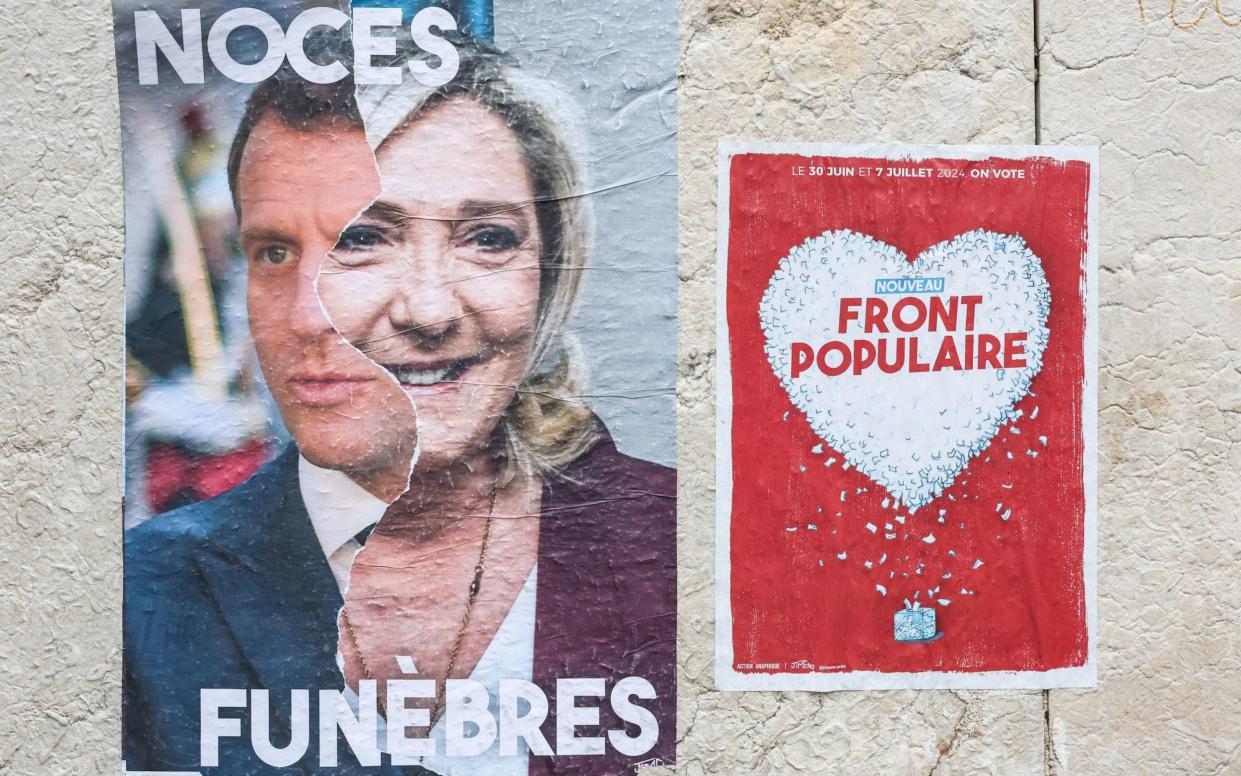France’s Fifth Republic may not survive the week

- Oops!Something went wrong.Please try again later.
- Oops!Something went wrong.Please try again later.
Two old democracies prepare for simultaneous upheavals – a historic first. France faces the more alarming prospect. We have few doubts about who will be governing us, and have some idea of what they intend. In France, the prospects are utterly uncertain as to people, policies and consequences.
How did it get to this? It has been a long, long time coming.
The French – forgive a stereotype – like things clear. President Macron said he called his shock election, the second round of which is on Sunday, to establish “clarity”. His people do not like muddling through and fudging. While the British constitution has evolved but never ended – not since 1688, at least – the French since 1789 have had three monarchies, two empires, five republics and 15 constitutions. In every case, the aim was to end turbulence and establish clear principles of government.
The pattern has been of fluctuation between liberty and order, democracy and authority. Liberty and democracy have often found expression in the streets, on the barricades, in turbulent parliaments overthrowing governments every few months, and (to their critics) in being incapable of dealing with crisis.
When enough people tired of disorder and uncertainty, the pendulum swung. Hence the two Napoleons, the restored Bourbons, and Marshal Pétain in 1940, all backed by the army, the Church, the peasantry, and the well-off. When authority stumbled or was destroyed by foreign armies, democracy flooded back as the Second, Third and Fourth Republics.
The bedrock of French politics was, then, the unending struggle between liberty and order, which translated into Left and Right. The struggle was sometimes violent, always antagonistic, but also stable. A map of the Left (big cities, industrial areas, and the least Catholic regions) and the Right (Catholic rural areas in the west and south) lasted from the 1790s until the 1970s. The Communists and the Gaullists were then the big beasts.
De Gaulle was the last political giant, an ideal Right-wing saviour: a patriotic Catholic soldier, who in a semi-coup ended the chaos of the Fourth Republic, collapsing amid the Algerian War. With remarkable political judgment, he created a novel hybrid of Left and Right – an elected republican monarchy – aimed at ending the instability of what has been called the Franco-French war. Parliament, though downgraded, remained. The system adopted the Republican name (it was the Fifth) and liberal democratic values. It rested on the unique figure of de Gaulle, the great helmsman who, soaring above party squabbles, safeguarded the nation’s true destiny.
But even de Gaulle was in reality removed humiliatingly by riots and strikes, and in the following half-century the substitute de Gaulles were politicians of diminishing stature, as everywhere in the democratic world. Yet the vast powers of the presidency – “so dangerous”, thought one commentator, “that it would be folly to put them even into the hands of a saint” – made the system function.
But the solidly rooted forces that had structured political life started crumbling. Gaullism lost its charisma and became just another centre-Right force. Communism was abandoned by workers in rust-belt industries who started voting in the 1980s for the provocative old bruiser Jean-Marie Le Pen – especially where there was a large immigrant population.
Here, 40 years ago now, was the seedbed of France’s present predicament. Old Le Pen was irremediably tarnished by association with wartime collaboration and the Algerian war. For the young who vote for his daughter Marine, this is ancient history. Now it is she who is on course for the presidency in 2027.
Another straw in the wind was the negative referendum on the EU constitution in 2005: only the richer parts of the Paris region voted “yes”. Today these are the only areas thoroughly resistant to Marine Le Pen, whose Eurosceptic party (though a minority) led the poll almost everywhere else.
The final prop – of course – was kicked from under the system by Macron himself, who led a strange centrist-populist insurgency in 2017 which eviscerated the old parties. Now that Macron himself has alienated the country, France is left with two extremes and a hollow centre. Populism is sweeping much of the West: this is the particular version shaped by France’s history.
The Fifth Republic was meant to reassure a people always nervous about their own capacity for political turbulence that there was someone in charge. There no longer is.
There is a final barrier against Le Pen, which will probably hold for now. France’s turbulent history has bequeathed an ancient defence against extremism: two-round voting. Over many generations, “Republicans” have been willing to unite against “the Right”. We shall see how much this visceral instinct will impel conservative Macronists to vote in Sunday’s second round for extreme Left-wing candidates, and vice-versa.
In the first round, you vote for what you want; in the second, you vote against what you fear. On Sunday the French will show the world, and each other, what they fear most.
Robert Tombs is professor emeritus of French history at St John’s College, Cambridge

